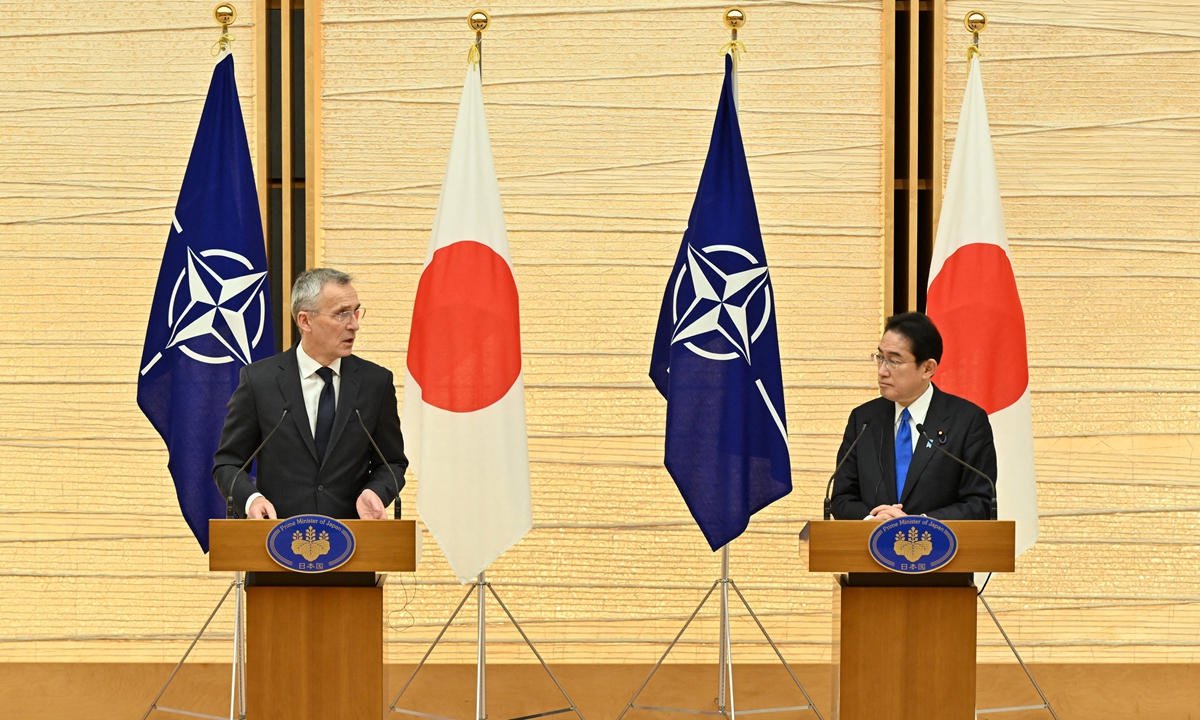
Japanese Prime Minister Fumio Kishida (R) and Jens Stoltenberg, Secretary General of the NATO attend a join press conference at the prime minister's office in Tokyo on January 31, 2023. Photo: AFP
NATO Secretary General Jens Stoltenberg delivered a speech at Keio University in Japan on Wednesday. If we are to describe this speech, it would be labeled with "poor level, bad influence, and insidious intentions." It was not worth mentioning, but the negative trends of NATO and Japan exposed from its content deserve the high vigilance of the entire Asia-Pacific region. It can be said that the speech is full of "ominous omens."
Before visiting Japan, Stoltenberg went to South Korea. Although he also played up the "China threat" in South Korea and tied China, Russia and North Korea together with malicious intent, his words were far less straightforward and blatant than in Tokyo. Facing the Japanese audience, Stoltenberg spent a lot of time attacking China. He said in a sensational tone, "What is happening in Europe today could happen in East Asia tomorrow." He also said unctuously, "China is not our adversary," but what he said later was basically to smear and slander China. He accused China of "substantially building up its military forces, including nuclear weapons, without any transparency" and said that China (the Chinese mainland) is attempting to assert control over the South China Sea, and threatening Taiwan.
Stoltenberg's words and actions in Japan and South Korea are very different, which reflects many deep-seated problems, indicating that the two countries play different roles in NATO's strategic design. In Seoul, he mainly spoke to the South Korean side, which was the target of his persuasion and incitement, while in Tokyo, he spoke to the entire Asia-Pacific region, and the Japanese authorities stood by as accomplices and co-conspirators.
A joint statement was issued after talks between Stoltenberg and Japanese Prime Minister Fumio Kishida on January 31, in which the common stance against China and Russia was very prominent, and the intention to interfere in the situation across the Taiwan Straits was very strong. These will undoubtedly create risks of camp confrontation and division in the Asia-Pacific region. The role NATO is playing is exactly the same as it has played on the European soil. In other words, it is actually NATO itself that is promoting the idea that "what is happening in Europe today could happen in East Asia tomorrow."
A wolf whose base camp and activities have been in the far west for a long time has found a foothold in East Asia with great ambitions. Japan is the one who lured the wolf into the house, and also seeks a high-sounding reason. As the secretary general of NATO, Stoltenberg is not qualified to dictate East Asian affairs, not to mention even giving outrageous statements. To some extent, Japan created such an opportunity for him and NATO. Stoltenberg did not hesitate to speak sweetly about Japan, saying that among NATO's partners, none is closer or more capable than Japan. He also praised Japan's substantial increase in defense budget and revision of its security strategy, behaviors that have been widely questioned in the Asia-Pacific region. NATO and Japan formed a vicious mutual reinforcement.
Obviously, NATO is an unwelcome "guest" to East Asia and the entire Asia-Pacific region. Most members here view Stoltenberg's visit with suspicion and concern. These doubts and worries are not unfounded; instead, they are quite necessary. Probably only Japan has the most positive attitude toward NATO's intervention in the Asia-Pacific affairs. It is not difficult to guess what Japan is thinking about. The crux of the problem is that its perception of China is wrong. It sees a fast-growing China as a threat and seeks to take measures like Washington's to block the pace of China's development. However, it is impossible to achieve it with the power of Japan alone. Therefore, Tokyo began to work hard to introduce foreign forces into the region and "unite them" to create military, diplomatic and political pressure on China.
As two political entities with a disgraceful history of war, both "NATO's Asia-Pacificization" and "Japan's militarization" face strong moral and practical resistance. It is precisely because of this that the two sides appear to be more "like-minded." NATO's hand in the Asia-Pacific is trying to carve out a channel in Japan. This kind of devilish deal is bad news for the Asia-Pacific and even the whole world. All countries in the region, including peace-loving forces in Japan, should take precautions against and resist the connection between Tokyo and NATO.




